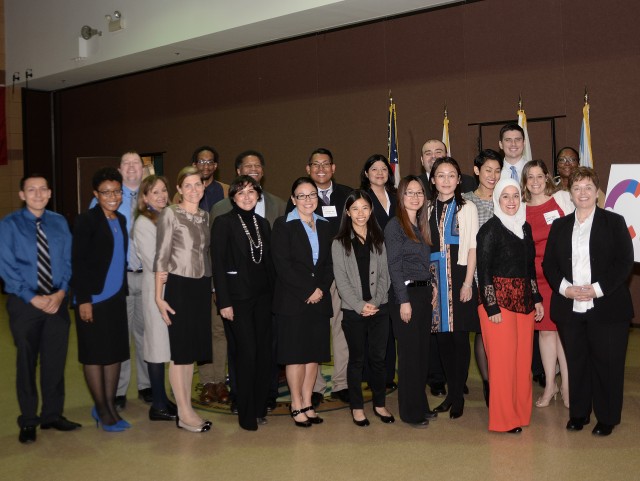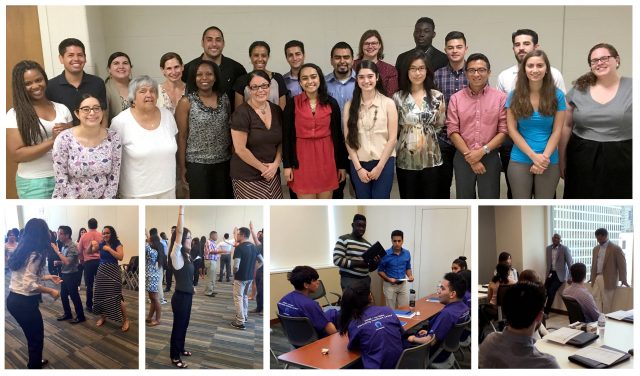
CHICAGO — A new $17.4 million grant from the National Cancer Institute (NCI) will help three Chicago universities work together with many of the city’s underserved communities to foster meaningful cancer research, education, training and outreach.
According to the Illinois Department of Public Health, Chicago communities that are low-income or predominantly African-American or Latino face cancer death rates up to double the national average.
The five-year grant will support the creation of the Chicago Cancer Health Equity Collaborative (ChicagoCHEC), led by researchers from the Robert H. Lurie Comprehensive Cancer Center of Northwestern University, the University of Illinois at Chicago (UIC) and Northeastern Illinois University.
The collaborative held a joint community kick-off event Oct. 23 at the Arturo Velasquez Institute in Chicago’s Little Village neighborhood to launch this initiative to help reduce the burden of cancer in low-income and racial and ethnic minority communities.
The effort is being led by community-oriented physician-scientists and researchers: Melissa Simon, MD, the George H. Gardner, MD, Professor of Clinical Gynecology in the Department of Obstetrics and Gynecology at Northwestern University Feinberg School of Medicine; Robert Winn, MD, Associate Vice President for Community-Based Practice at the University of Illinois Hospital & Health Sciences Systems, professor of Medicine, UIC College of Medicine and Director, University of Illinois Cancer Center; Christina Ciecierski, PhD, associate professor of economics at Northeastern Illinois University; and Moira Stuart, PhD, associate professor of health, physical education, recreation and athletics at Northeastern.
“Despite the existence of five academic medical centers and millions of dollars spent on cancer research and treatment of Chicago residents, we are still only in our infancy in responding to cancer health disparities,” Dr. Simon said. “We have been working on setting the groundwork and assembling this grant over the last five years as a way to move forward and foster the wonderful work of communities and organizations already working towards improving cancer equity.”
UIC and Northeastern are two institutions with well-known track records of enrolling and graduating students from minority and nontraditional backgrounds and that have longstanding partnerships with Chicago communities. A major goal for the collaborative is to build bridges between the Lurie Cancer Center and UIC and Northeastern.
“UIC plays a unique role in this partnership,” said Dr. Winn. “We have seven health sciences colleges that will contribute to achieving the objectives of the grant, as well as a network of federally qualified community clinics, our Mile Square Health Centers, that put us in direct contact with patient populations on the south and west sides of Chicago, which are disproportionately burdened by cancer. Additionally, the University of Illinois Cancer Center is integrated into our Mile Square Health Centers, so we are well-positioned to make a significant impact on reducing cancer disparities.”
Ciecierski of Northeastern, a native Chicagoan and first-generation American, said she is excited to be a part of such an important collaboration.
“The goal of our partnership is to connect with all Chicago communities,” said Ciecierski. “We will use the tools of education, research and advocacy to improve health among Chicagoans, especially those chronically underserved. As an educator, I know that training and community outreach will spread good health to all Chicago neighborhoods.”
In addition to community and institutional partnerships, one area of focus for the collaborative will be research to improve cancer prevention, early detection, treatment and survivorship.
“The efforts of this collaborative will enable us to develop programs that aim directly at the cause of disparities and empower those who are most severely impacted by cancer inequities,” said Stuart, who is also of Northeastern.
The collaborative is the first of its kind established in the Midwest and already includes more than 20 researchers and educators from diverse backgrounds and academic disciplines across 14 departments in seven schools from all three institutions.
The activities of the Chicago Cancer Health Equity Collaborative will be focused on:
- Establishing multidisciplinary research programs in cancer disparities, including those that incorporate biomedical, socio-behavioral, basic and translational science.
- Mobilizing researchers, educators, community leaders, students, organizations and patients in innovative cancer education and outreach programs to improve health.
- Providing training, mentoring and learning opportunities to recruit and retain minority and underrepresented students in health and cancer research careers.
- Supporting the career development and advancement of minority and underrepresented faculty and scientists.
Leadership from the three universities share their support of this collaboration:
Robert H. Lurie Comprehensive Cancer Center of Northwestern University
“We are making exciting progress in the war against cancer. New approaches are emerging in cancer treatment, screening and risk reduction, but not everyone is benefitting equally from these advances. This award will support our efforts as an NCI-designated Comprehensive Cancer Center to community outreach and to reducing cancer health disparities in the communities that need it most.”
— Leonidas Platanias, MD, PhD, Director of the Lurie Cancer Center
University of Illinois at Chicago
“We have a strong commitment to serve our community and the needs of our students. This partnership expands on opportunities to educate and train a pipeline of minority and underrepresented students who are interested in pursuing health-related careers and develops a diverse workforce to meet the nation’s biomedical, behavioral and clinical research needs.”
–Michael Amiridis, UIC Chancellor
Northeastern Illinois University
“We are so pleased to be able to continue our partnership with the Lurie Cancer Center and to add UIC to the very important partnership that began five years ago. The focus on cancer health disparities in underserved communities fits well within the mission of Northeastern. The work that we’ve done together with Dr. Simon’s team for the past five years has resulted in foundational research and scholarship by faculty and students from both universities. This grant provides a unique opportunity to build on this work toward a more comprehensive approach to addressing the critical need for cancer equity.”
— Dr. Maureen Gillette, Dean of Northeastern Illinois University’s College of Education
Media Contacts:
Northwestern University: Marla Paul at 312-503-8928 or [email protected]
University of Illinois at Chicago: Sharon Parmet at 312-413-2695 or [email protected]
Northeastern Illinois University: Mike Hines at 773-442-4240 or [email protected]


